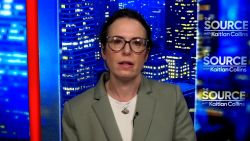A version of this story appeared in CNN’s What Matters newsletter. To get it in your inbox, sign up for free here.
President Joe Biden says he’s been forced to violate a campaign promise by adding some new construction to Donald Trump’s border wall.
Big city Democratic mayors are angrily demanding more engagement from the Democratic president to help deal with a wave of migrants seeking asylum. One of them – New York Mayor Eric Adams – is in Latin America this week.
Immigration reality is scrambling the normal immigration rhetoric in uncomfortable ways for Democrats, who generally want to appear welcoming but appear to be taking a harder line along with their new positions.
Why is Biden now behind new border wall?
Here’s how CNN White House reporter Priscilla Alvarez explained Biden’s about-face during an appearance on the network Thursday:
Alvarez: This boils down to the administration running up against a deadline. A source that I spoke with this morning said that the 2019 congressionally appropriated funds for a border barrier had to be used by the end of fiscal year 2023.That means the administration had to make a choice – they either use the money or they don’t use it, and they decided they’re going to use it for these border barriers in South Texas.
How did Biden justify the switch?
He still says border walls don’t work. “The border wall – the money was appropriated for the border wall,” Biden told reporters in the Oval Office on Thursday. “I tried to get them to reappropriate it, to redirect that money. They didn’t, they wouldn’t. And in the meantime, there’s nothing under the law other than they have to use the money for what it was appropriated. I can’t stop that.”
Where will these barriers go?
Trump likes to claim that he completed a wall along the Mexico border. That’s inaccurate. As CNN’s fact check team has documented, Trump’s efforts to get a wall built mostly ended up rehabbing 373 miles of barrier. They added 52 miles of primary wall.
Regardless, Biden as a candidate said he wouldn’t add to it. Now his administration is targeting high traffic areas around the Rio Grande.
It’s an area, Alvarez notes, where from October to August there were nearly 300,000 encounters between US officials and migrants.
Is this exactly what Trump did when he built border barriers?
Biden, like Trump, will need to waive dozens of federal laws – The Clean Air Act and Safe Drinking Water Act, among others – in order to build the new barriers. But there are also major differences between Biden’s actions and Trump’s.
Again, from Alvarez: “These are funds appropriated by Congress. Under the Trump administration they also used Pentagon funds. That is not what is happening here. And last month, (the Biden administration) sought public input from the community as they sought plans to put up the barriers.”
Still, this is a violation of Biden’s pledge during the 2020 campaign to build no new border wall and the latest public acknowledgment that US immigration policy is not one of open arms.
What has changed?
At the border, a fresh tide of migrants has overwhelmed authorities this fall. The images include waves of people crossing illegally. Stowaways on the roofs of trains temporarily closed the international railway bridge in Eagle Pass, Texas, last month.
In northern blue states, governors and mayors are getting louder and more urgent in their calls for the White House to do more to stem the tide of migrants coming into the US and being sent north.
“The failure of federal policies is now impacting the people of Chicago in a very dramatic way,” said a frustrated Mayor Brandon Johnson in a news conference this week.
Illinois Gov. JB Pritzker sent a letter to the White House demanding federal coordination to deal with people crossing the border.
Who is in charge?
The federal government is supposed to oversee border policy instead of the current system where migrants are bused north as a political statement by Republican governors.
Pritzker and Johnson both gave White House officials an earful in a hastily arranged conference call late Sunday, according to CNN’s report.
Adams, who has been voicing agitation at the federal government for months, is on a trip to Mexico, Ecuador and Colombia this week to discourage asylum-seekers from traveling to the US and then New York City.
“We are at capacity,” he has said.
Adams plans to visit the Darien Gap, the undeveloped mountainous region between Colombia and Panama through which many migrants pass after payments to cartels.
CNN reported back in September on the breakdown in the relationship between the White House and New York’s mayor.
Shortly thereafter, the Biden administration did expand a Temporary Protected Status program to nearly 500,000 Venezuelans asylum seekers, giving them much quicker access to work permits.
That blanket move may also have undercut the administration’s attempt to cut down on the influx of migrants when it promised a tough new policy for undocumented border crossers in May.
What does polling suggest?
Gallup tracks Americans’ attitudes toward immigration and their surveys suggest an uptick in the past two years in the portion of people who want decreased immigration to the US to 41%, its highest level since 2014. Those who want immigration to stay at its present level (31%) or increase (26%) combine for a majority. Democrats since the 1990s have been much more open to immigration than Republicans, although Democrats’ support for increased immigration has fallen since 2021 after decades of generally increasing.
At capacity in New York
In New York City, some 120,000 migrants have arrived buses over the past year, many bussed in from southern Republicans like Gov. Greg Abbott in Texas. New York, which has a policy to shelter and feed them, has struggled to find space and funding.
Earlier this month, CNN spent the night in the Roosevelt Hotel, which closed as a commercial enterprise during the pandemic and now is used to temporarily house migrants.
New York officials have said the city will spend $5 billion on the migrant influx this year, straining the city.
Catch-22 on work
Those seeking asylum from violence in places like Venezuela or Haiti have to wait 150 days inside the country before they can apply for a temporary work permit. Obtaining a job earlier could jeopardize their asylum status. Proposals for a state-level work permits, like one called for by New York Gov. Kathy Hochul, have been rejected at the federal level. It creates a system where the migrants, if they ultimately want to stay and work, cannot work when they first get here.
Biden’s move to allow Venezuelans access to work permits was meant to address these concerns.
Why not just change the work rules?
That could require updating immigration laws. Even if the House of Representatives was not currently paralyzed by its lack of a speaker, lawmakers have made little progress in decades of trying to update immigration laws.
Plus, the judicial system devoted to processing the cases of migrants is already backlogged, which means everything takes more time.
A dangerous trek
A CNN team back in April filed an incredible report on what the journey through the Darien Gap is like, interviewing people about why they were fleeing their homes and following them as they risked their lives to pass through the muddy and dangerous region.
More recently, CNN talked to migrants at the southern border of Mexico as they prepared to travel north toward the United States.
“Stories abound from the people here, most originally from Venezuela, of why they left their homes and what they’ve gone through so far on their journeys to Ciudad Hidalgo,” wrote CNN’s David Culver. “The adults sometimes become emotional but more shocking is the calm, matter-of-fact, narration from the children.” Read his report.
That is another debate for attention in the US – how to encourage stability in Central and South American countries, Venezuela in particular, from which so many migrants are embarking on this journey and seeking something better in the US.






















